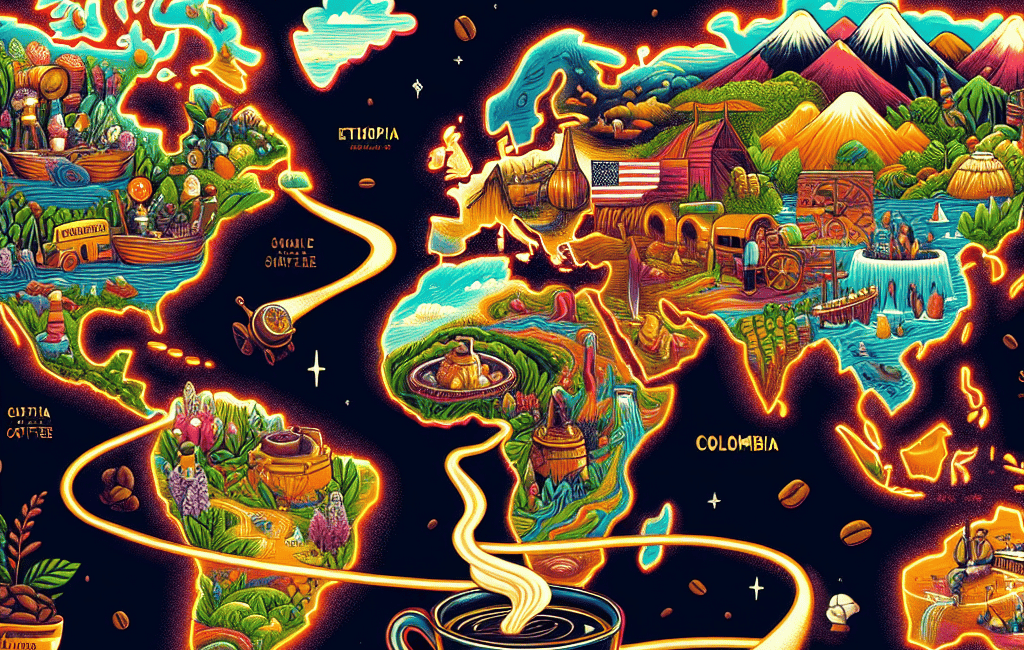
Single-Origin Coffee: The Flavor Adventure You’re Missing Out On
Coffee isn’t just a beverage; it’s an experience, a culture, and for many, a daily ritual. Among the myriad of coffee options available today, single-origin coffee stands out as a unique choice that promises a remarkable journey of flavors. If you’ve never ventured into the world of single-origin coffee, you’re in for a delightful surprise.
What is Single-Origin Coffee?
Single-origin coffee refers to coffee that comes from a single producer, crop, or region. This means that the beans are sourced from one specific location, allowing the unique characteristics of that area—such as climate, soil type, and altitude—to shine through in the final brew. Unlike blends, which combine beans from various regions to create a consistent flavor profile, single-origin coffees offer a taste that reflects the specific conditions and practices of their origin.
The Impact of Terroir
Much like wine, the concept of terroir plays a significant role in the flavor profile of single-origin coffee. Terroir encompasses the environmental factors that affect a crop’s characteristics, including:
- Climate: Temperature, rainfall, and sunlight all influence the growth of coffee plants.
- Soil: The mineral composition and type of soil can affect flavor nuances.
- Altitude: Higher altitudes typically produce beans with greater acidity and complex flavors.
By understanding these factors, coffee enthusiasts can appreciate how specific regions produce distinct flavor profiles, leading to a richer tasting experience.
Exploring Flavor Profiles
One of the most exciting aspects of single-origin coffee is the variety of flavors it offers. Here are some common regions known for their unique coffee characteristics:
1. Ethiopian Coffee
Ethiopia is often considered the birthplace of coffee. Ethiopian coffees are known for their floral notes, bright acidity, and fruity undertones, often reminiscent of berries or citrus.
2. Colombian Coffee
Colombia is famous for its smooth, well-balanced coffees. Expect mild flavors with hints of caramel and nutty undertones, making it a favorite for many coffee drinkers.
3. Guatemalan Coffee
Guatemalan coffees are rich and full-bodied, often featuring chocolate and spice notes. The region’s volcanic soil contributes to the depth of flavor.
4. Kenyan Coffee
Kenya produces some of the most sought-after coffees in the world. Known for their bright acidity and fruity flavors, Kenyan coffees often have notes of blackcurrant and citrus.
5. Sumatra Coffee
Sumatra is known for its earthy, full-bodied coffees with low acidity. These beans often have a rich, syrupy quality, with notes of chocolate and spice.
The Brewing Process
To fully appreciate the unique flavors of single-origin coffee, the brewing method you choose can significantly impact your experience. Here are a few popular methods to consider:
- Pour Over: This method allows for greater control over the brewing process, enhancing the clarity of flavors.
- French Press: The immersion brewing style of a French press captures the full-bodied essence of the coffee.
- Aeropress: This versatile method is great for extracting flavors quickly and efficiently, resulting in a rich cup.
Experimenting with different brewing techniques can reveal new dimensions of flavor in single-origin coffees.
Why Choose Single-Origin Coffee?
Beyond the delightful taste, there are several reasons to choose single-origin coffee:
- Traceability: Single-origin coffees often come with detailed information about their source, allowing you to appreciate the story behind your cup.
- Sustainability: Many single-origin producers focus on sustainable farming practices, ensuring that your coffee is ethically sourced.
- Flavor Diversity: With a wide range of flavors available, single-origin coffee offers a unique tasting experience that blends enthusiasts crave.
How to Get Started with Single-Origin Coffee
If you’re ready to embark on your flavor adventure, here are some steps to get you started:
- Research: Look for local roasters who specialize in single-origin coffee. Many roasters provide detailed tasting notes and origin information.
- Taste: Start with a variety of coffees from different regions. Keep a tasting journal to note your preferences.
- Ask Questions: Don’t hesitate to ask your barista or roaster about the beans. They can provide insights and recommendations.
- Experiment: Try different brewing methods and adjust variables like grind size and water temperature to find your perfect cup.
Join the Single-Origin Community
As you dive deeper into the world of single-origin coffee, consider joining a community of coffee lovers. Online forums, local coffee clubs, and social media groups can provide valuable insights and connections. Sharing your experiences and discoveries with others can enhance your coffee journey and introduce you to new flavors and brewing techniques.
Conclusion
Single-origin coffee is more than just a trend; it’s an invitation to explore the diverse and rich world of coffee flavors. From the unique terroir of each region to the meticulous brewing process, every cup tells a story waiting to be discovered. So the next time you reach for that familiar blend, consider taking a leap into the vibrant world of single-origin coffee—your taste buds will thank you!


